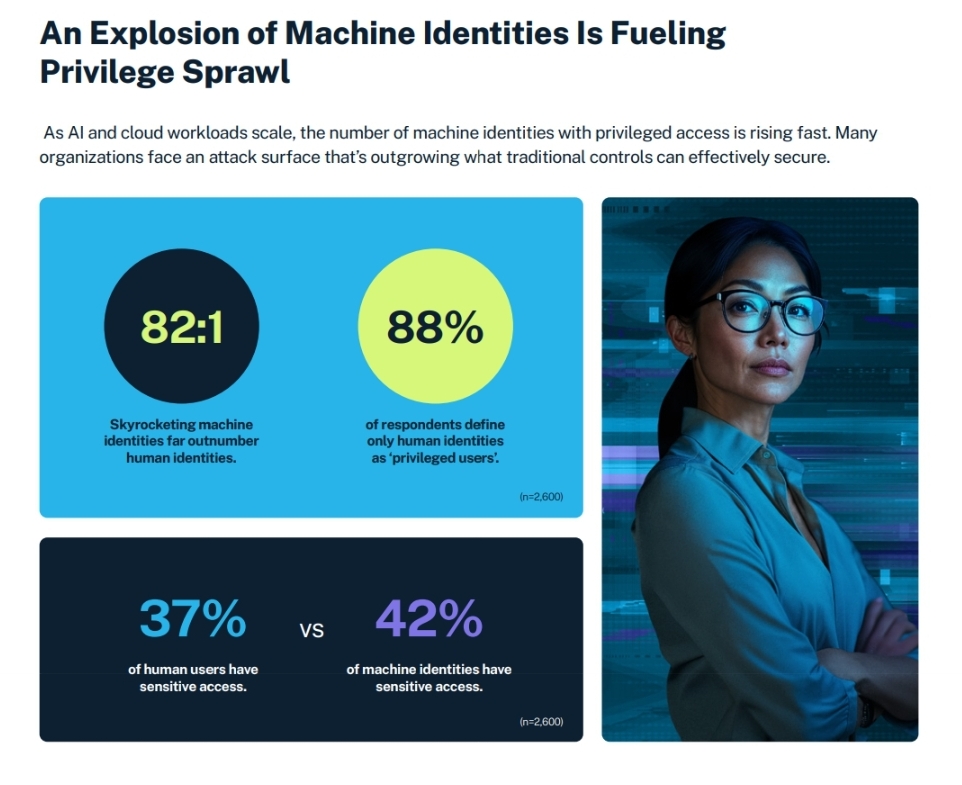Indian Companies Trading Cybersecurity for Speed: CyberArk 2025 Report Raises Alarm on AI and Privileged Access Risks
As technology accelerates at a breakneck pace, businesses in India are increasingly opting for speed over security. The latest 2025 Identity Security Landscape report by CyberArk (NASDAQ: CYBR), a global leader in identity security, reveals a troubling trend. Companies are sidelining cybersecurity in a race to adopt cutting-edge AI and cloud technologies. The findings indicate that 77% of Indian organizations are prioritizing operational efficiency over cybersecurity, creating a massive vulnerability in their identity security infrastructure. This prioritization of speed and efficiency over security raises critical concerns for the future of digital resilience and trust.
The report highlights that organizations are neglecting the rising complexity of managing machine identities. Machine identities, which refer to the digital accounts used by software, bots, and AI agents, are growing at a staggering pace. Presently, for every human identity, organizations are managing 82 machine identities. What’s more concerning is that many of these machine identities hold privileged or sensitive access rights. In India, however, 88% of organizations still view a “privileged user” as only a human, failing to account for the expanding risks presented by AI-driven systems and cloud workloads.
AI and Cloud: Boon or Breach?
Artificial Intelligence (AI) has undoubtedly revolutionized the way businesses operate. However, it has also given rise to a new set of security challenges. According to the CyberArk report, 68% of Indian respondents acknowledge that AI and cloud technologies are generating significant unmanaged access risks. In addition, 37% of organizations struggle to secure “shadow AI,” which refers to AI tools adopted by departments without formal security oversight.
The sheer volume of new privileged identities generated by AI is expected to soar in 2025. Despite this, 68% of organizations admit they lack the proper controls to manage and safeguard this influx of machine identities. AI systems now handle everything from sensitive customer data to critical decision-making processes, so security leaders rightly worry about the risks of manipulated AI agents and unauthorized access.
Rohan Vaidya, Area Vice President for SAARC & India at CyberArk, emphasized, “The rapid adoption of AI in India’s fast-moving business landscape has introduced complex challenges in managing machine identities. Security leaders must rethink their identity strategies to keep pace with technological growth without compromising on data security.”
The Pressure from Insurers and Regulators Grows
Indian businesses are also facing growing external pressure to strengthen their cybersecurity posture. 85% of organizations report that they are receiving increasing demands from both cyber insurers and regulators to enforce stricter controls on privileged access. This growing pressure underscores the reality that cybersecurity is no longer optional—it’s a fundamental requirement for doing business.
These pressures are not just theoretical. The risks associated with poorly managed privileged access are very real. Over the past year, 76% of organizations globally have experienced at least two identity-centric breaches. These breaches include sophisticated phishing attacks, vishing enabled by deepfake technology, and third-party identity theft. These incidents highlight the dangerous fragmentation of identity security programs, which is making businesses more vulnerable than ever.
In India, 68% of organizations acknowledge the threat posed by identity silos. Identity silos refer to the fragmentation of identity data across multiple tools and platforms, which significantly complicates the task of tracking access rights and privileges. As companies increasingly adopt hybrid and multi-cloud environments, keeping track of who has access to what, and under which conditions, becomes even more challenging.
The Urgent Need for a Unified Identity Security Strategy
Given the mounting pressures from both internal and external sources, businesses in India must urgently reconsider their approach to identity security. The report stresses the importance of a unified, comprehensive identity security strategy that takes into account both human and machine identities, spans across cloud and on-premises environments, and implements least-privilege access as the default.
The key recommendations from CyberArk’s report are as follows:
- Redefine Privileged Access: Organizations must expand their definition of privileged access to include machine identities. Machines, bots, and AI agents now wield significant access to critical systems and sensitive data, and these identities must be managed with the same rigor as human identities.
- AI-Aware Identity Security Solutions: As AI continues to dominate, businesses need to invest in security solutions that are specifically designed to detect and manage AI-driven behavior. These tools must be able to identify unauthorized or malicious AI activity before it can do damage.
- Eliminate Identity Silos: Fragmented identity data across various tools and platforms creates unnecessary risk. Organizations should prioritize centralizing identity visibility and analytics to ensure a holistic view of all access rights and potential vulnerabilities.
- Integrate Identity Security into DevOps: As machine identities are often created and forgotten within DevOps and automation pipelines, it’s crucial to integrate identity security into these processes. By doing so, businesses can ensure that every identity—whether human or machine—is properly managed from the start.
In addition to these specific strategies, businesses must also view identity security as a business enabler rather than a compliance requirement. The evolving digital landscape demands that organizations adopt a proactive approach to cybersecurity. Identity security is not just about preventing breaches; it is about preserving trust in a world that is becoming increasingly intelligent and interconnected.

Conclusion: The Future of Cybersecurity in India
The findings in CyberArk’s 2025 report serve as a wake-up call for Indian organizations. As businesses rapidly evolve with AI and cloud technologies, they must not neglect the foundational element of cybersecurity. The risks associated with AI-driven systems and machine identities are real and growing. However, by adopting a unified, proactive identity security strategy, businesses can protect their systems, preserve trust, and enable continued innovation.
CyberArk’s report underscores that cybersecurity is no longer just an IT concern; it is a business imperative. To read the full 2025 Identity Security Landscape report, visit CyberArk’s website and take the first step toward securing your organization’s future in an AI-driven world.

